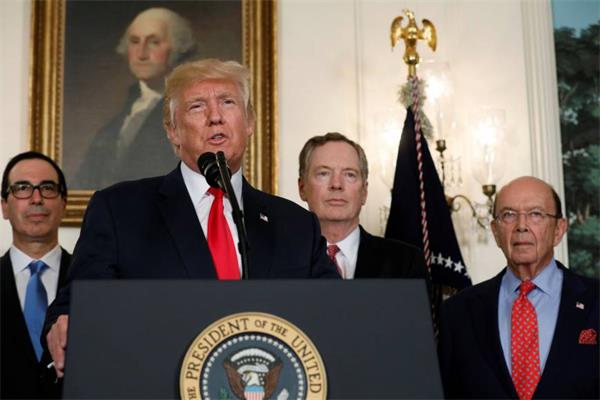US envoys coming to negotiate on trade
By ZHONG NAN | China Daily | Updated: 2018-05-01 01:20

China must prepare more measures to counter new trade moves by the United States if the two parties fail to reach an agreement during bilateral economic and trade talks in Beijing later this week, economists said on Monday.
The trade dispute, which was initiated by US President Donald Trump, has already generated strong domestic opposition in the US.
Trump announced on Thursday that Treasury Secretary Steven Mnuchin and US Trade Representative Robert Lighthizer would travel to Beijing for talks.
The US delegation will also include Trump's top economic adviser, Larry Kudlow, and trade adviser Peter Navarro. The talks are expected to take place on Thursday and Friday, according to media reports.
"Even though China's firm stance has prompted Trump to send all his top economic officials for trade negotiations to avert a trade war, it will be a tough talk between the two sides. Otherwise the Trump administration and the president himself will appear weak," said Tu Xinquan, a professor at the University of International Business and Economics.
In addition to trade, Tu said, the US wants to limit China's ability to attract foreign direct investment. The US is also deeply concerned about China's industrial upgrades, technology transfers, talent flows and intellectual property protection. It also wants to relieve the downward pressure on its stock market, Tu said.
"The US used to be an ideal destination for investment because it offered global investors stability and asset security. But the unstable leadership of Trump has put international capital in the US at risk and made investors in the US market nervous," he said.
Mei Xinyu, a senior research fellow at the Ministry of Commerce's Chinese Academy of International Trade and Economic Cooperation, said the escalating trade dispute has angered US farmers and companies — especially those in the high-tech manufacturing and service sectors — and has put Republican political candidates under pressure as the US midterm congressional elections approach in November.
China has become more sophisticated in handling trade disputes with timely and effective countermeasures, he said. Since March, the ministry has said several times that China will not abandon its rights and interests, and will take all necessary measures to firmly defend them.
Long Guoqiang, vice-president of the State Council's Development Research Center, said that because China and the US are both major economies involved in global value chains, exports from both sides include a large value inflows from other economies.
"The upcoming negotiations therefore cannot be considered as a meeting to resolve bilateral trade issues," he said. "It is about maintaining the rules-based multilateral trading system of the world."
























